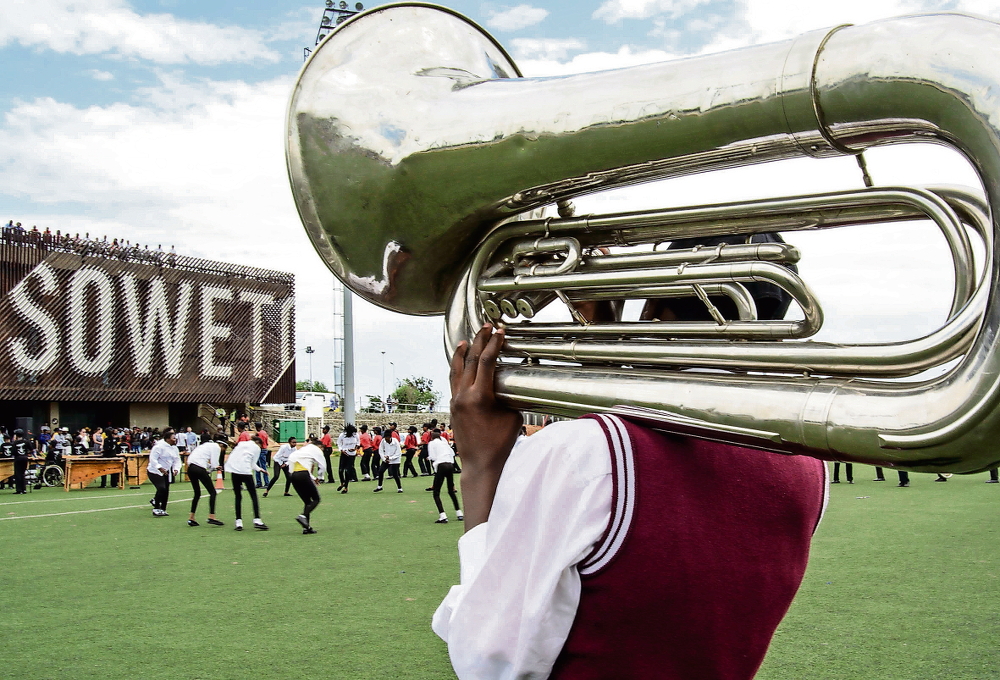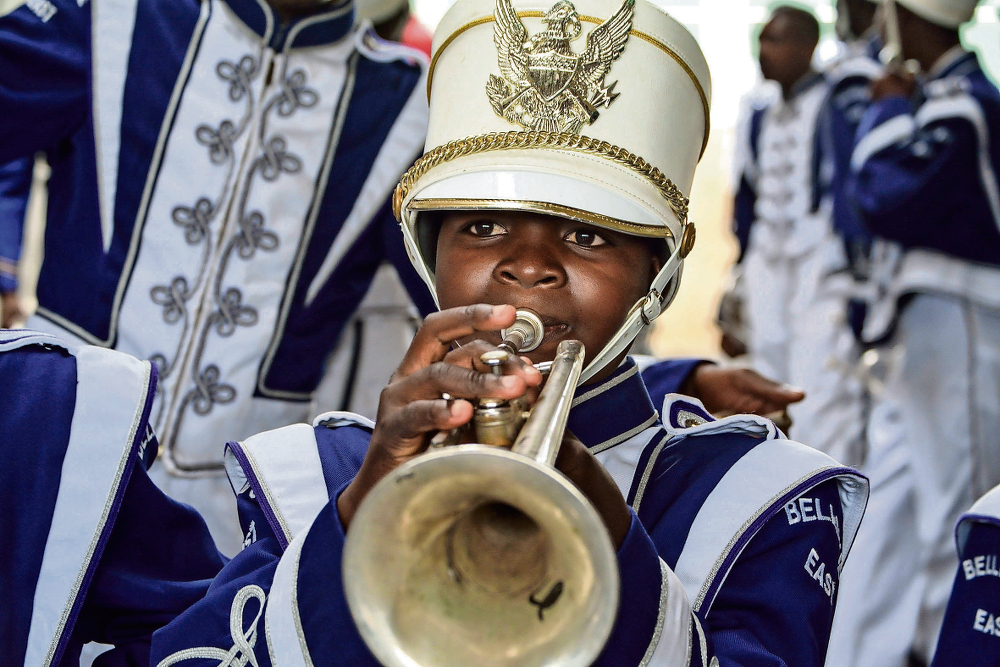Instruments of change: Eager youngsters compete at the Field Band Foundation’s national championships in Soweto.
Each bus that arrives at the Nike Training Centre in Klipspruit, Soweto, deposits half-asleep children and adults who stretch themselves awake in the soft morning light. They arrive well in time for the spectacle later in the day – 12 field bands from the nine provinces competing in the Field Band Foundation’s 2016 national championships.
And as the last bands bus in, hectic but co-ordinated preparations are made and the mood settles into one of tense anticipation. Horns are laid out on the grass while steel pans, marimbas and other pit percussion instruments are assembled and tuned. Marching drums stand lined up and ready for use and some bands run through their routines a final time before performing in front of a panel of local and international judges.
“After you get on to that field,” one bandmaster says, “there is no rewind; you only get one chance.”
The foundation is a not-for-profit organisation established by the PG Group in 1997 when the local glass company celebrated its centenary. Wanting to create a project to benefit young people in under-resourced areas, the foundation borrowed the American field band tradition, adapted it for local conditions and used recreational musical tutelage as a vehicle for skills transfer.
Today, the Field Band Foundation uses the teaching of music and dance as a way to raise HIV awareness and transfer leadership, communication and conflict resolution skills to young people.
The national championship event
Prince Lengoasa, bandmaster of the Salvation Army’s Johannesburg brass band, sits on the panel. He judges each band’s overall music performance, a task he describes as “looking at a picture and trying to figure out all the colours and the shades that the colours actually come out to represent”.
To score well, he says, bands need to demonstrate an ability to balance loud and soft sounds and accentuate basses, melodies and countermelodies in ways that demonstrate a layering of sound and interplay between each section of the band.
Lengoasa was born in 1962 and, by the age of six, he was already honing his chops in the Salvation Army brass band. Lengoasa says that, during the 1940s and 1950s, “there used to be brass bands that the different municipalities had, and then that died off and a new movement came with the Field Band Foundation, where communities were reintroduced to brass band playing”.

The national championship took place at the Nike Training Centre in Klipspruit, Soweto. (Setumo-Thebe Mohlomi)
The spectacle of the national championship event serves the foundation in two key areas: it motivates more than 6 500 band members in about 45 bands nationwide to excel and it gives the private sector and government sponsors a glimpse of what the organisation does with their money.
The foundation’s mobility helps to attract sponsorship. Vans, which act as both storage and transport for the instruments, allow for bands to be established and kept running in remote areas.
The scale of the national championships makes the foundation look flush. But foundation chief executive Nicolette du Plessis cautions: “It’s easier to look at the performances and think that it always looks like this. It doesn’t!” She says the bands often operate in under-resourced areas (61% of members come from unemployed households), meaning that tutors often give lessons outdoors, exposed to the whims of the elements.
Playing in the rain
Jacob Mhlapeng, the co-ordinator of one of the Soweto field bands, has first-hand experience of the challenges the bands face. For example, several days before the national championships, Johannesburg experienced otherworldly thunderstorms and he and his band had no sheltered rehearsal space in which to prepare for the nationals.
But, Mhlapeng says, such was the determination of his band that the members went ahead with the scheduled rehearsal, regardless of the rain. “We played in the rain until the rain stopped. It was so fascinating to see them so dedicated to what they are doing, motivating me as an adult to say: ‘Let us go, let us work more’,” he says.
Mhlapeng began his music tutelage with the foundation when he was 13. After several years, he was taken into the organisation’s Teachers in Training programme and undertook trips to the United States and to Norway to further his knowledge.
After his travels, he started a new band in Rustenburg before returning to Dobsonville, Soweto, where he now teaches. Mhlapeng’s marching band performed at the opening and closing ceremonies of the 2010 Fifa World Cup.
For the cynic, the foundation is nothing more than a vehicle through which companies can channel corporate social investment monies in return for tax incentives and positive public relations spin. But its governance and leadership models help ensure the organisation not only continues its existing projects, but is also able to expand its reach.

The business and civil society relationship
Du Plessis sees the close relationship between business and civil society as important, maybe even crucial. She says that, “without that percentage of spend that comes from corporate South Africa, there are a lot of things that would not take place; there are a lot of activities that would never ever be funded”.
And the organisation enjoys the services of a board that includes prominent business minds. It was led by Herman Mashaba until recently, when he stepped down to become the Democratic Alliance’s mayoral candidate for Johannesburg.
Mashaba’s Black Like Me cosmetics brand made him a millionaire and now he sponsors several field bands, one of them in Hammans-kraal in northern Gauteng, where he was raised.
Mashaba recounts his teenage years when he and his friends would drink beer, smoke dagga and listen to Hugh Masekela to escape the debilitating effects poverty can have on the psyche. Similarly, the field bands offer young people a refuge from the reality that they confront on a daily basis.
Acquiring new skills
The difference is band members acquire new skills while exercising their form of escape. Band mom Nthabiseng Maine says belonging to a field band has helped her daughter, Makgotso, to avoid social ills such as alcohol and drug abuse, as well as teenage pregnancy.
At the championships, each uniformed band enters the field and presents their selection of music and accompanying dance, and it is impossible not to get emotionally invested in the success of a particular band. Everyone in the audience is moved in some way – the enthusiastic cheer on and the pessimistic nod their heads stiffly to the beat kept by marching percussionists.
After the last band performs, judges deliberate and finally decide on the Blouberg band from Limpopo as the overall winner. A presenter with more muscle than rhythm had repeated the phrase: “Everyone is a winner” that afternoon. As the Blouberg band members hoist their co-ordinator on to their shoulders and sing celebratory songs, other bands pack away their instruments and prepare for their journeys home. Their exodus was so meticulous and efficient that it seems the winners on that field were not one band but the sum of each of their individual parts.